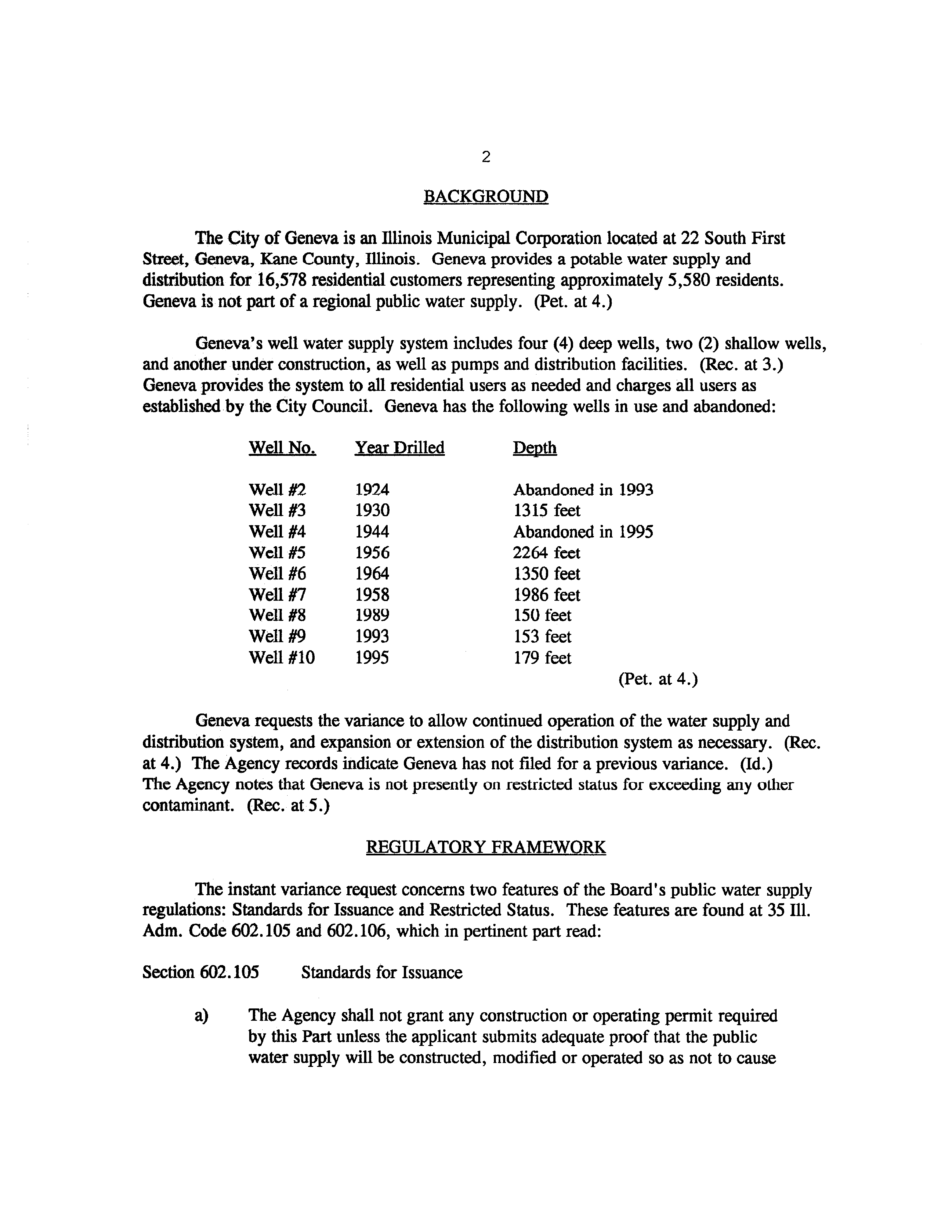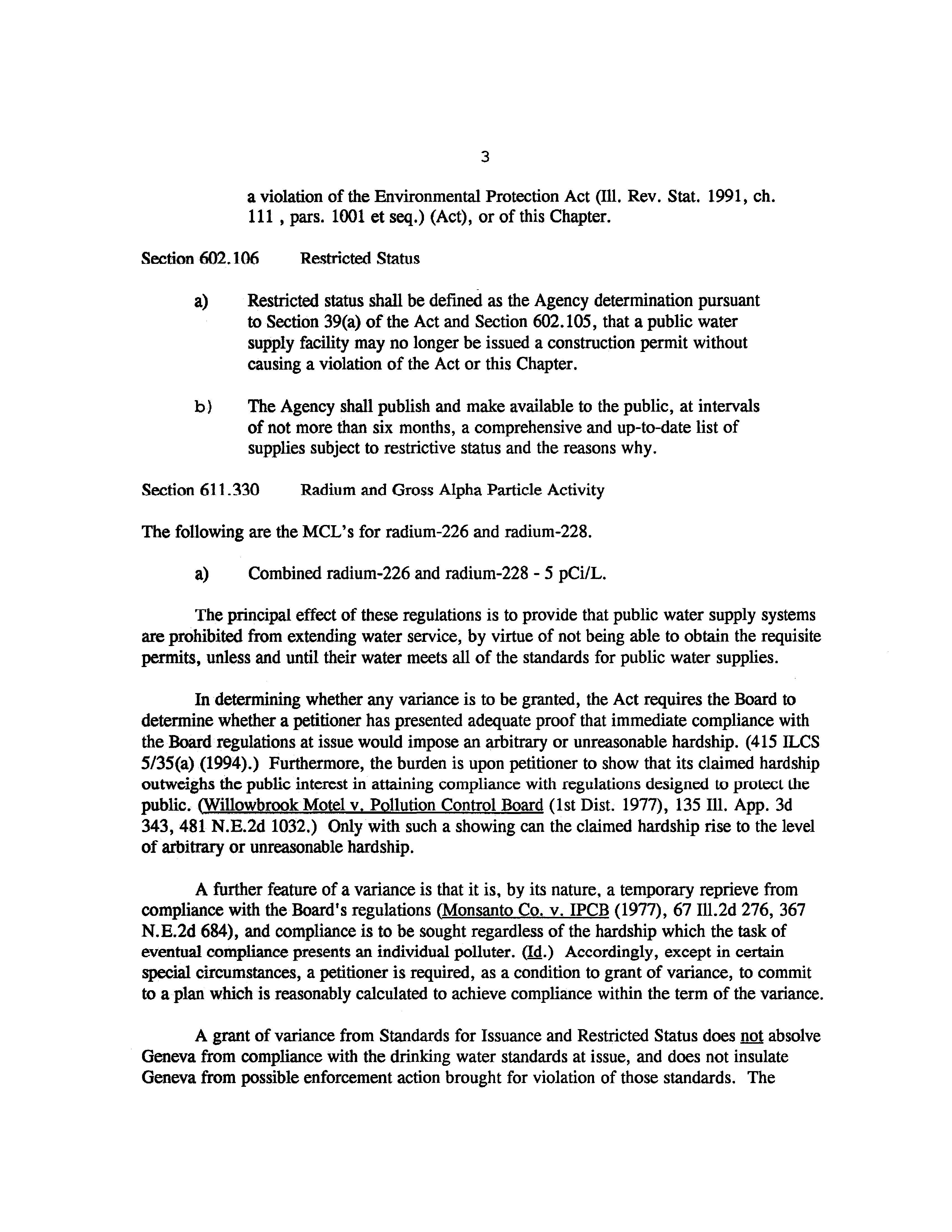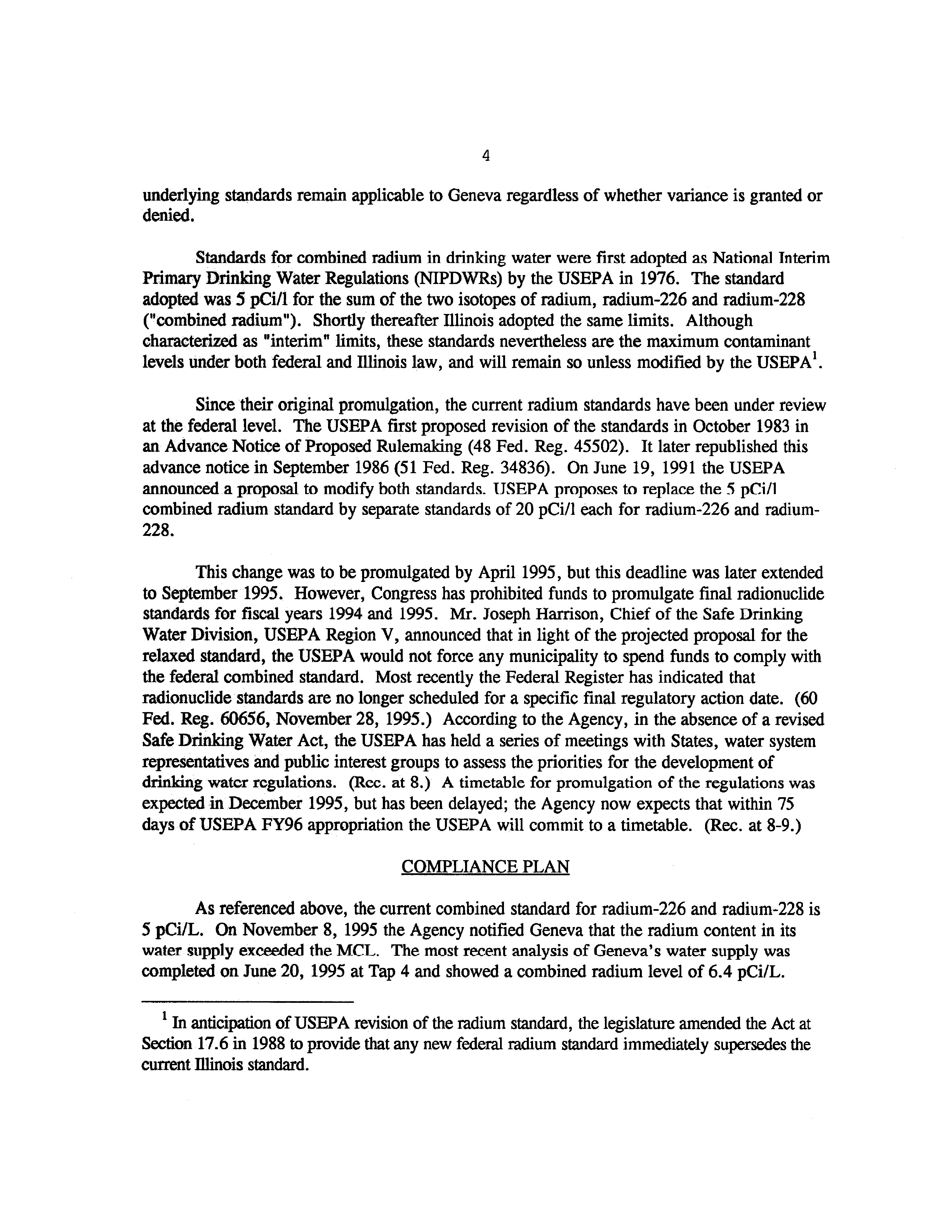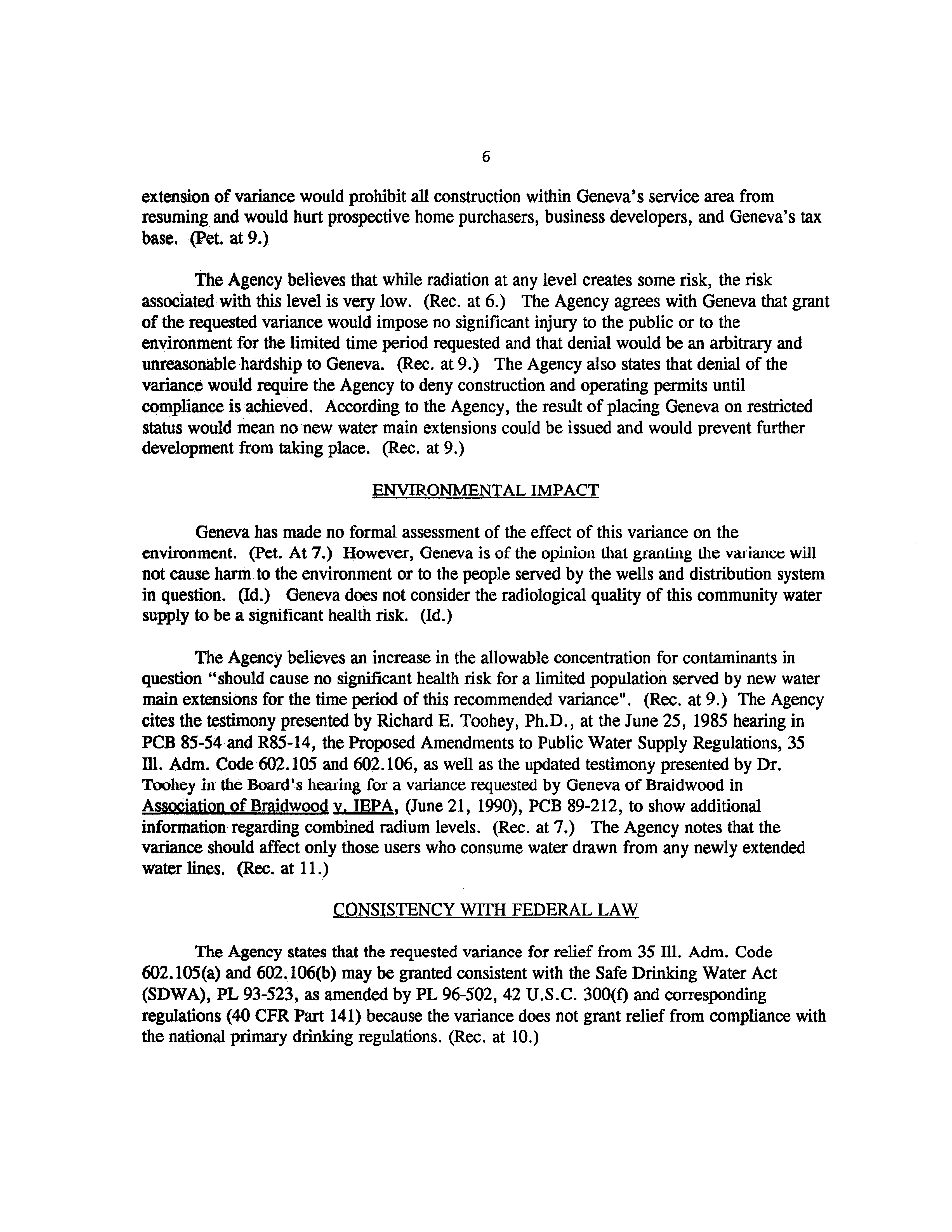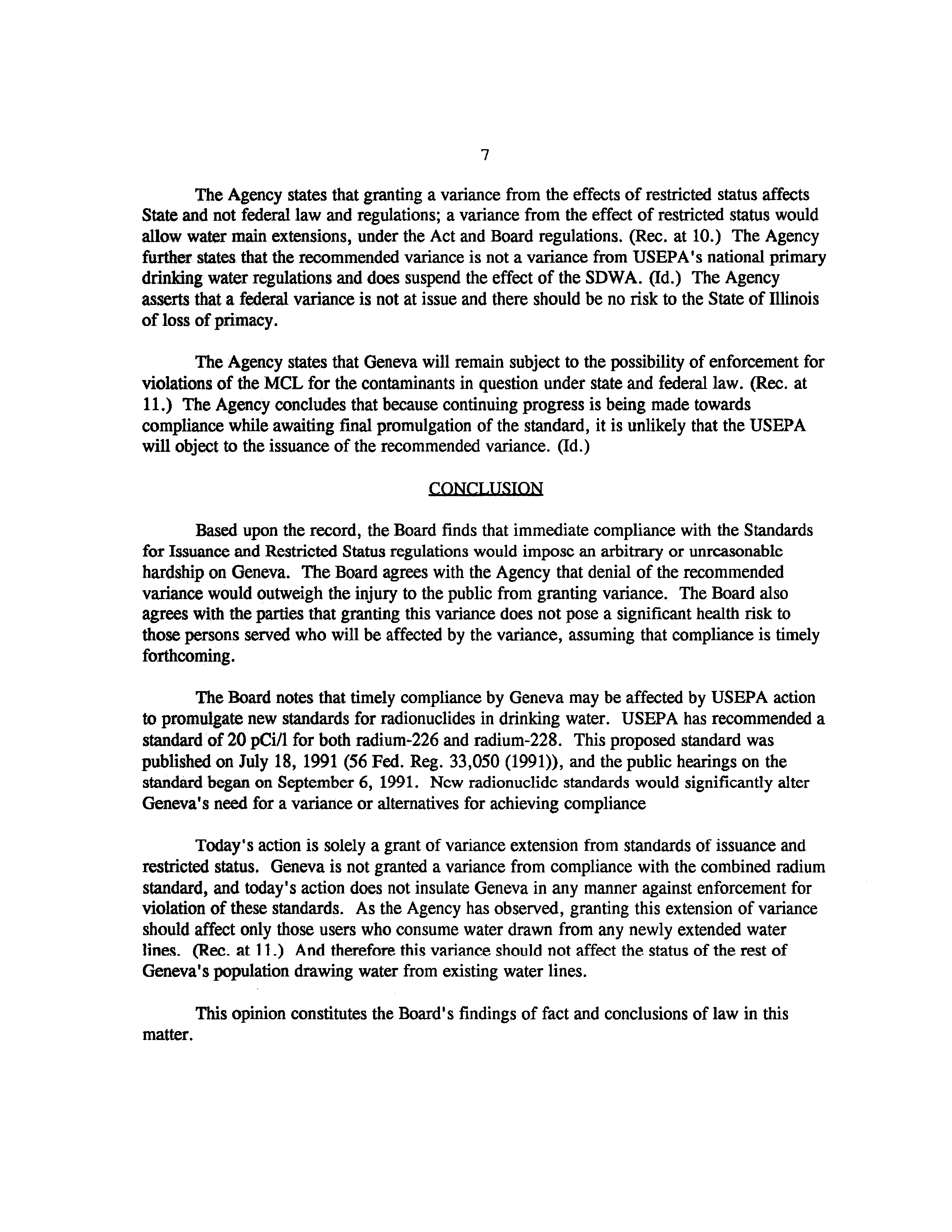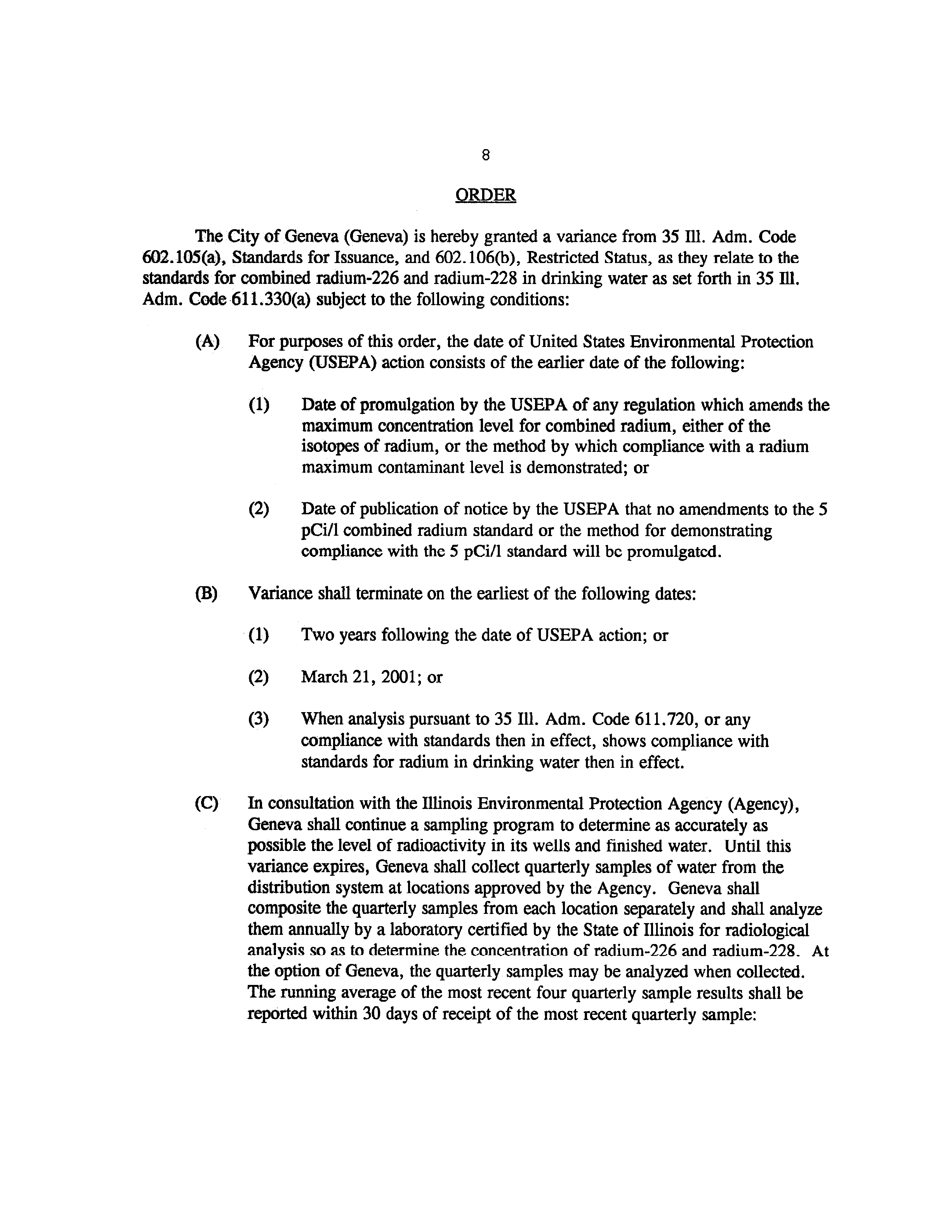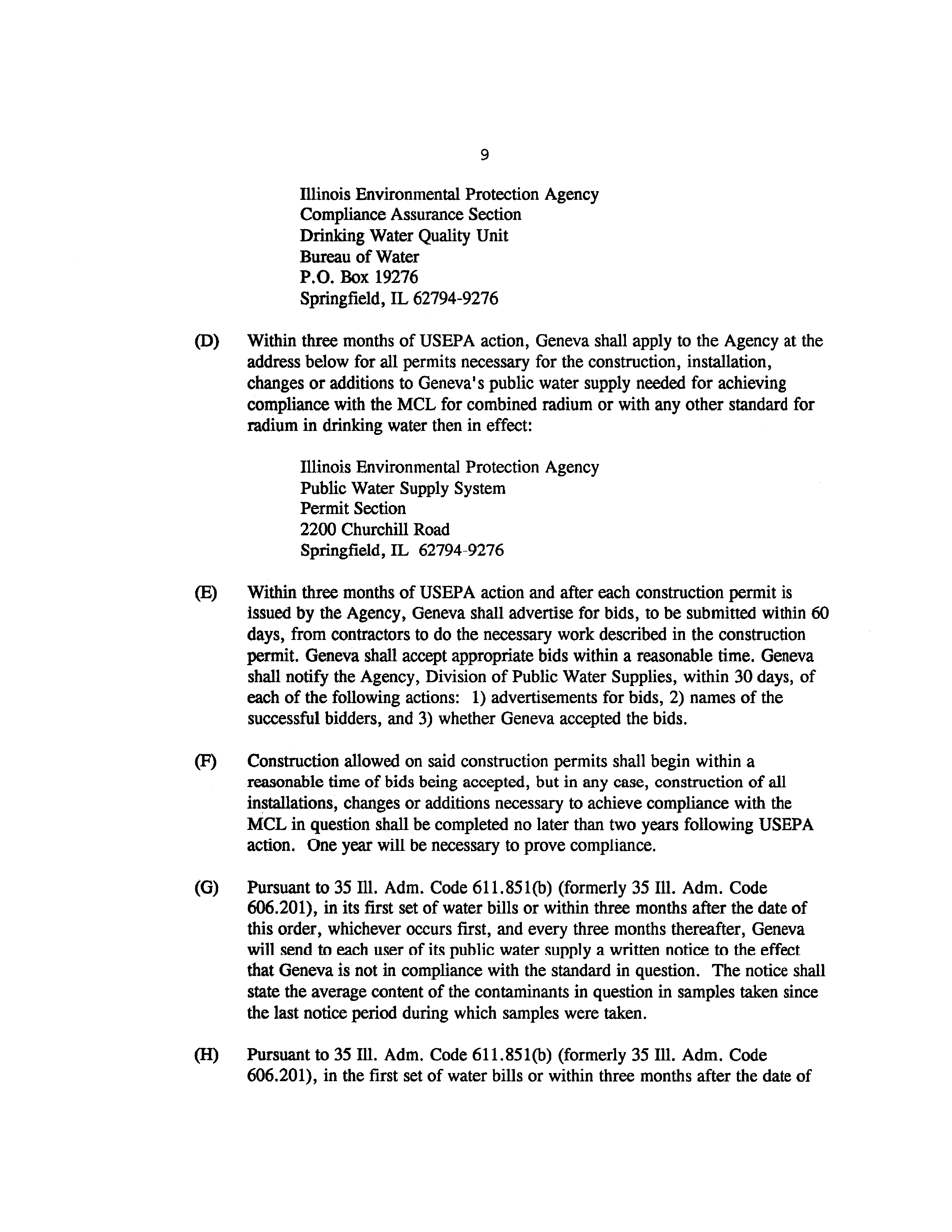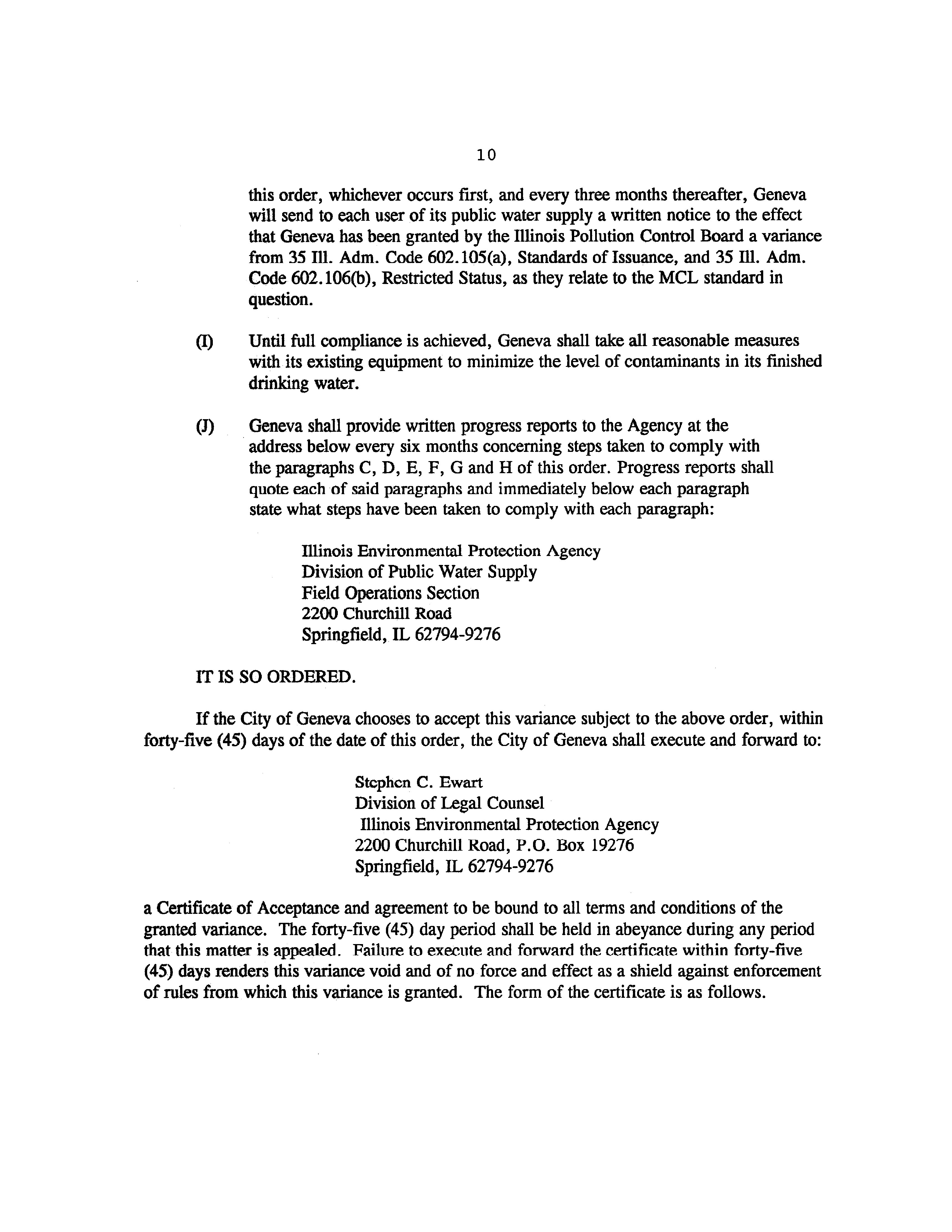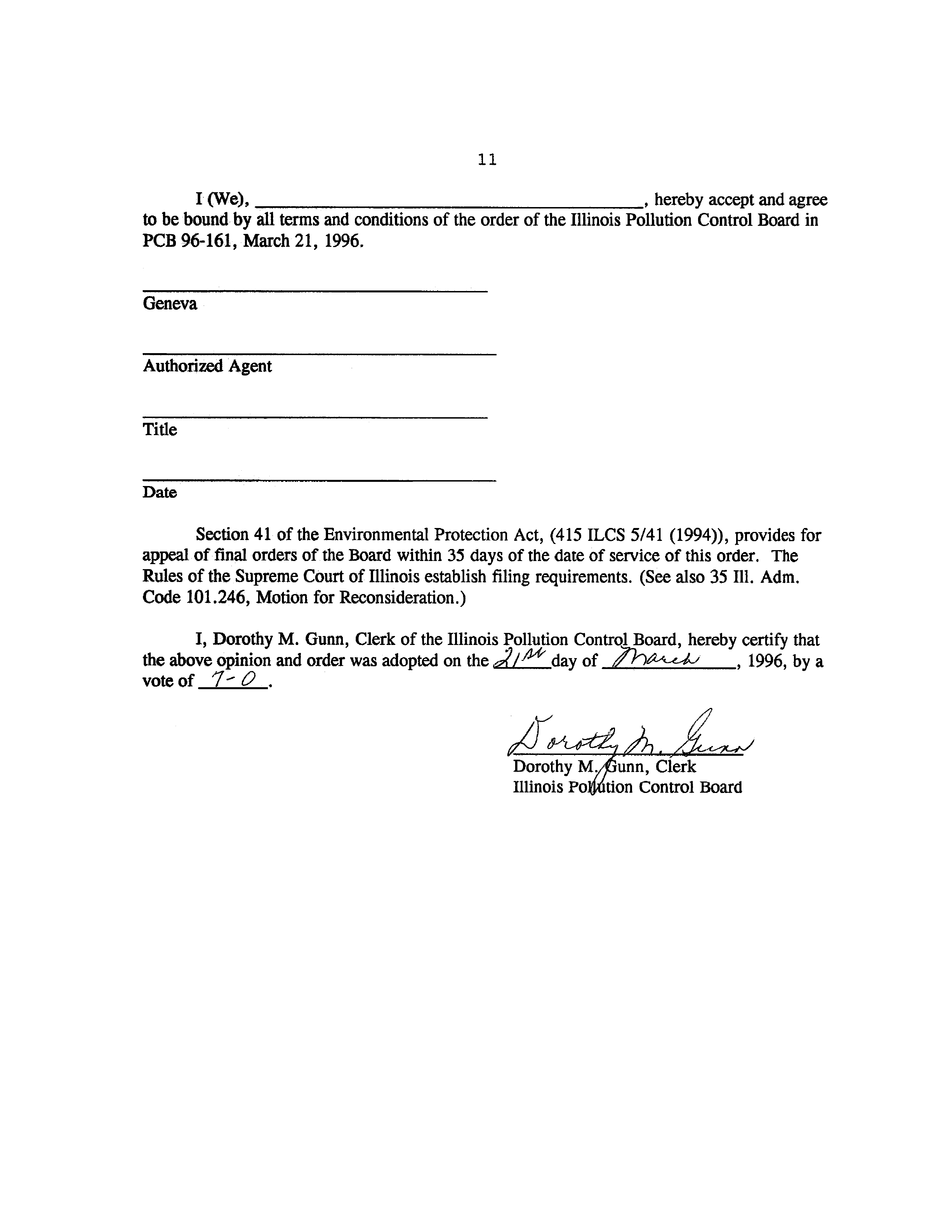1bLIiNU1~
IULLUHUN
LUNIXUL
IiUAKU
March 21,
1996
CITY OF GENEVA,
an illinois
)
Municipal Corporation,
)
)
Petitioner,
)
)
v.
)
PCB96-161
)
(Variance
-
Public Water Supply)
ILLINOIS ENVIRONMENTAL
)
PROTECTION AGENCY,
)
)
Respondent.
)
OPINION AND ORDER OF THE BOARD
(by
R.C. Flemal):
This matter is before the Board on the January 22,
1996 filing by the City of Geneva
(Geneva) of a
petition
forvariance.
Geneva seeks relief from 35
Iii.
Adm.
Code 602.105(a),
Standards forIssuance,
and
602.106(b), Restricted Status,
but only to the extent those rules
involve 35 ifi.
Adm.
Code 611.330 (combined radium-226 and radium-228).
Geneva requests
a variance for a term of five years.
On February 8,
1996 the Illinois Environmental Protection Agency (Agency) filed its
variance recommendation.
The Agency recommends that the variance be granted for relief
from
35111.
Adm.
Code 602.105(a), Standards for Issuance, and 602.106(b), Restricted
Status,
subject to certain conditions.
Geneva waived hearing and none was held.
The Board’s responsibility in this matter arises from the Environmental Protection Act
(Act) (415 ILCS
5/1
et seq. (1994).)
The Board is charged there with the responsibility of
granting variance from Board regulations whenever it is found that immediate compliance with
the regulations would impose an arbitrary or unreasonable hardship upon the petitioner.
(415
ILCS
5/35(a).)
The Agency is required to appear in hearings on variance petitions.
(415 ILCS
514(f).)
The Agency is also charged, among other matters,
with the responsibility of
investigating
each variance petition and making a recommendation to
the Board as
to the
disposition of thepetition.
(415
ILCS
5/37(a).)
For the following reasons, the Board finds that Geneva has presented adequate proof
that immediate compliance with the Board’s regulations for Standards for Issuance and
Restricted
Status
would impose an arbitrary or unreasonable hardship.
Accordingly, the
variance is granted, subject to conditions set forth in
the attached order.
2
BACKGROUND
The City of Geneva is an Illinois Municipal Corporation located at 22 South First
Street, Geneva, Kane County, Illinois.
Geneva provides a potable water
supply and
distribution for 16,578 residential customers representing
approximately 5,580 residents.
Geneva is
not part of a regional public water supply.
(Pet.
at 4.)
Geneva’s well water supply
system includes four (4) deep wells, two
(2) shallow wells,
and another under construction, as well as pumps and distribution facilities.
(Rec. at 3.)
Geneva provides the system to all residential users as needed and charges all users as
established by the City Council.
Geneva has the following wells in
use and abandoned:
Well No.
Year Drilled
Depth
Well #2
1924
Abandoned
in
1993
Well #3
1930
1315 feet
Well #4
1944
Abandoned in 1995
Well
#5
1956
2264
feet
Well #6
1964
1350 feet
Well #7
1958
1986
feet
Well
#8
1989
150 feet
Well
#9
1993
153
feet
Well #10
1995
179
feet
(Pet.
at 4.)
Geneva requests the varianceto allow continued operation of the water
supply and
distribution system,
and expansion or extension of the distribution system as necessary.
(Rec.
at 4.)
TheAgency records indicate Geneva has not filed for a previous variance.
(Id.)
The Agency notes that Geneva is not presently on restricted
status for exceeding
any
other
contaminant.
(Rec. at
5.)
REGULATORY FRAMEWORK
The instant variance request concerns two features of the Board’s public water supply
regulations: Standards for Issuance and Restricted Status.
These features are found at 35 Ill.
Adm.
Code 602.105 and
602.106, which in pertinent part read:
Section 602.105
Standards for Issuance
a)
The Agency shall not grant any construction or operating permit required
by this Part unless the applicant submits
adequate proof that the public
water supply will be constructed,
modified or operated so as not
to cause
3
a violation of the Environmental Protection Act
(Ill.
Rev.
Stat.
1991,
ch.
111
,
pars.
1001
et seq.) (Act), or of this Chapter.
Section 602.106
Restricted Status
a)
Restricted status shall
be defined as the Agency determination pursuant
to Section 39(a) of theAct and Section 602.105, thata public water
supply facility may
no
longer be issued a construction permit without
causing a violation of
the Act or this
Chapter.
b)
The Agency shall publish and make available to
the public, at intervals
of not more than six months,
a comprehensive and up-to-date list of
supplies subject to restrictive status and the reasons why.
Section 611.330
Radium and
Gross Alpha Particle Activity
The following are the MCL’s for radium-226 and radium-228.
a)
Combined radium-226 and radium-228
-5
pCi/L.
The principal effect ofthese regulations is to provide that public water supply
systems
areprohibited from extending water service,
by virtue of not being able to obtain the requisite
permits, unless and until their water meets all of the standards for public water
supplies.
In determining whether any variance is to be granted, the Act requires the Board
to
determine whether a petitioner has presented adequateproof that immediate compliance with
theBoard regulations at issue would impose an arbitrary or unreasonable hardship.
(415 ILCS
5/35(a)
(1994).)
Furthermore, the burden is upon petitioner to
show that its claimed hardship
outweighs the public interest
in
attaining compliance with regulations
designed to protect Lhe
public.
(~Wil1owbrook
Motel v.
Pollution Control Board
(1st Dist.
1977),
135 Ill.
App. 3d
343, 481
N.E.2d 1032.)
Only with such a showing can the claimed hardship
rise to the level
of arbitrary or unreasonable hardship.
A further feature of a variance is that it is,
by its nature, a temporary reprieve from
compliance with the Board’s regulations
(Monsanto Co.
v.
IPCB (1977), 67 Ill.2d 276,
367
N.E.2d 684), and compliance is to be sought regardless of the hardship which the task of
eventual compliance presents an individual polluter.
(14.)
Accordingly, except
in certain
special circumstances, a petitioner is required, as a condition to grant of variance,
to commit
to a plan which is reasonably calculated to achieve compliance within the term of the variance.
A grant of variance from Standards for Issuance and Restricted Status does
n~
absolve
Geneva from
compliance with the drinking water
standards at issue,
and does not insulate
Geneva from possible enforcement action brought for violation ofthose standards.
The
4
underlying standards remain applicable to Geneva regardless of whether variance is granted or
denied.
Standards forcombined radium in drinking water were first adopted as National
Interim
Primary Drinking Water Regulations (NTPDWRs) by the USEPA in
1976.
The standard
adopted was
5
pCi/l for the sum of the two isotopes of radium, radium-226 and radium-228
(“combined radium”).
Shortly thereafter illinois adopted the same limits.
Although
characterized as “interim” limits,
these standards nevertheless are the maximum contaminant
levels Under both federal and Illinois law,
and will remain
so unless modified by
the USEPA’.
Since their original promulgation, the current radium standards have been under review
at the federal level.
The USEPA first proposed revision of the standards in
October
1983
in
an Advance Notice ofProposed Rulemaking (48 Fed.
Reg.
45502).
It later republished this
advance notice in September
1986 (51 Fed.
Reg.
34836).
On June 19,
1991
the USEPA
announced a proposal to modify both
standards.
USEPA
proposes to replace the S pCi/i
combined radium standard by separate standards of 20 pCi/l
each for radium-226 and radium-
228.
This change was to be promulgated by April 1995,
but this deadline was later extended
to September
1995.
However, Congress has prohibited funds to promulgate
final radionuclide
standards for fiscal years
1994 and 1995.
Mr. Joseph Harrison, Chief of the Safe Drinking
Water Division,
USEPA Region V,
announced that in light ofthe projected proposal for the
relaxed standard,
the USEPA would not force any municipality to
spend funds to comply with
the federal combined
standard.
Most recently the Federal Register has indicated that
radionuclide standards
are no longer scheduled for a specific final regulatory action date.
(60
Fed. Reg.
60656,
November 28,
1995.)
According to the Agency,
in the absence of a revised
Safe Drinking Water Act,
the USEPA has held a series of meetings with States, water system
representatives and public interest groups to assess the priorities for the development of
drinking water regulations.
(Rec.
at
8.)
A timetable for promulgation of the regulations was
expected in December
1995,
but has been
delayed; the Agency now expects that within 75
days ofUSEPA FY96 appropriation the USEPA will commit to a timetable.
(Rec. at 8-9.)
COMPLIANCE PLAN
As referenced above, thecurrent combined standard for radium-226 and
radium-228 is
5 pCi/L.
On November 8,
1995
the Agency notified Geneva that the radium content in its
water supply exceeded the MCL.
The most recent analysis of Geneva’s
water supply
was
completed on June 20,
1995
at Tap 4 and showed a combined radium level of 6.4 pCi/L.
‘In anticipation of USEPA revision ofthe radium standard, the legislature amended the Act at
Section 17.6 in
1988
to provide that any new federal radium standard immediately supersedes the
current Illinois standard.
5
(Rec. at 4.)
Tap 5
analysis was completed on October
16,
1995 and showed a combined
radium content of 10.3 pCi/L.
(Rec. at 4-5.)
Geneva also states that analysis at Tap 6
showed
4.2 pCi/L.
(Pet. at
5.)
The results were compiled from four (4) consecutive quarterly
samples and exceeded the 5 pCi/L combined standard for radium-226 and radium-228.
Accordingly the Agency notified Geneva that it is being placed on Restricted
Status/Critical
Review List on November 20,
1995.
Sincebeing notified of the MCL violation, Geneva has
been investigating options for reducing the amount of radium in its water supply.
(Rec.
at 5.)
Prior to being placed on restricted status,
Geneva received the following reports
from
the illinois Department of Nuclear Safety,
Division of Radiochemistry, dated July
31,
1995,
August 2,
1995
and October 30,
1995:
Well No.
Radium 226
Radium
228
Combined Radium
2
Abandoned
3
Stand-by Well
4
Abandoned
5
Stand-by Well
6
3.2 pCi/L
(+/-0.l)
3.2 pCi/L
(+/-0.9)
6.4 pCi/L
7
38
pCi/L
(+/-0.2)
6.5
pCi/L
(-I-/-l.l)
10.3 pCi/L
8
2.2 pci/L
(+/-0.l)
2.2
pCi/L
(+/-0.8)
2.0 pCi/L
9
Stand-by Well
10
Under Construction
(Pet.
at 5-6.)
Geneva states
that although it has two
(2) operable shallow wells,
Wells 8 and 9, with a
combined pumping rate of 3500 gallons per minute and an additional shallow well under
construction,
the iron and manganese removal capacity for the shallow wells is limited
to
1500
gallons per minute.
(Pet. at 6.)
According to Geneva,
this limitation restricts the amount of
shallow well water
available for blending
with deep wells.
(Id.)
During the variance Geneva will maximize the utilization of water from Wells Number
8,
9 and
10,
and minimize the use of deep wells Numbers 3,
5,
6 and 7.
(Pet.
at 7,
Rec. at
5.)
Additionally Geneva states it will continue to take all reasonable measures to
minimize the
radium levels in its finished water, as well as submitting
the required bi-annual progress
reports to the Agency.
HARDSHIP
Geneva asserts that compliance with the
standard does not significantly benefit the
public or environment but may in fact harm both.
(Pet.
at 8.)
Geneva claims
that any
expenditure of money to
comply is an arbitrary or unreasonable hardship regardless of its
financial capacity to comply with the current MCL standard.
(Id.)
Denial of the requested
6
extension of variance would prohibit all construction within Geneva’s service area from
resuming and would hurt prospective home purchasers,
business developers,
and Geneva’s tax
base.
(Pet. at 9.)
The Agency believes that while radiation at any level creates some risk,
the risk
associated with this level is very low.
(Rec. at 6.)
The Agency agrees with Geneva that grant
of the requested variancewould impose no significant injury to the public or to the
environment for thelimited time period requested and that denial would be an
arbitrary and
unreasonable hardship to Geneva.
(Rec. at 9.)
The Agency also states that denial of the
variance would require the Agency to deny construction and operating permits until
compliance is achieved.
According to the Agency, the result of placing Geneva on restricted
status would mean no new water main
extensions could be issued and
would prevent further
development from taldng place.
(Rec. at 9.)
ENVIRONMENTAL IMPACT
Geneva has made no formal assessment ofthe effect of this variance on the
environment.
(Pet.
At 7.)
However, Geneva is of the
opinion
that granting the variance will
not cause harm to the environment or to the people served by the wells and distribution system
in question.
(Id.)
Geneva does not consider the radiological quality of this community water
supply to be a significant health risk.
(Id.)
The Agency believes an increase in
the allowable concentration for contaminants in
question “should cause no significant health risk for a limited population served by new water
main extensions for the time period of this recommended variance”.
(Rec.
at 9.)
The Agency
cites the testimony presented by Richard E. Toohey, Ph.D., at the June 25,
1985
hearing in
PCB
85-54
and R85-14, the Proposed Amendments to Public Water Supply Regulations,
35
Ill.
Adm.
Code 602.105 and 602.106,
as well as the updated testimony presented by Dr.
Toohey in the
Board’s
hearing for a variance requested by
Geneva of Braidwood in
Association of Braidwood v.
IEPA,
(June 21,
1990), PCB 89-212,
to show additional
information regarding combined radium levels.
(Rec. at 7.)
The Agency
notes that the
variance should affect only those users who consume water drawn from any newly extended
water lines.
(Rec. at 11.)
CONSISTENCY WITH FEDERAL LAW
The Agency states
that the requested variance for relief from
35
Ill.
Adm.
Code
602.105(a) and 602.106(b) may be granted consistent with the Safe Drinking Water Act
(SDWA), PL 93-523, as amended by PL 96-502,
42 U.S.C.
300(f) and corresponding
regulations
(40 CFR Part
141) because the variance does not grant relief from compliance with
the national primary drinking regulations.
(Rec, at
10.)
7
The Agency states that granting a variance from the effects of restricted status affects
State and not federal law and regulations; a variance from the effect of restricted status would
allow water main extensions, under the Act and Board regulations.
(Rec. at
10.)
The Agency
further states that the recommended variance is not a variance from USEPA’s national primary
drinldng water regulations and does suspend the effect of the SDWA.
(Id.)
The Agency
asserts that a federal variance is not at issue and there should be no risk to the State of Illinois
ofloss ofprimacy.
The Agency states that Geneva will remain subject to the possibility of enforcement for
violations of the MCL for the contaminants in question under state and
federal law.
(Rec. at
11.)
The Agency concludes that because continuing progress is being made towards
compliance while awaiting final promulgation of the standard,
it is unlikely that the USEPA
will object to the issuance of the recommended variance.
(Id.)
CONCLUSION
Based upon the record,
the Board finds that immediate compliance with the Standards
for Issuance and Restricted Status regulations would imposc an arbitrary or unrcasonablc
hardship on Geneva.
The Board agrecs with the Agency that denial of therecommended
variancewould outweigh the injury to the public from granting variance.
The Board also
agrees with the parties that granting this variance does not pose a significant health risk
to
those persons served who will be affected by thevariance,
assuming that compliance is timely
forthcoming.
The Board notes that timely compliance by Geneva may be affected by USEPA action
to promulgate new standards for radionuclides in drinking water.
USEPA has recommended a
standard of20 pCi/l for both radium-226 and radium-228.
This proposed standard was
published on July
18,
1991
(56 Fed.
keg.
33,050 (1991)), and the public hearings on the
standard began on September 6,
1991.
New radionuclide standards would
significantly alter
Geneva’s need for a variance or alternatives for achieving compliance
Today’s action is
solely a grant of variance extension from standards of issuance arid
restricted status.
Geneva is not granted a variance from compliance with the combined
radium
standard,
and today’s action does not insulate Geneva in any
manner against enforcement for
violation of these standards.
As the Agency has observed,
granting this extension of variance
should affect
only those users who consume water drawn from any newly extended water
lines.
(Rec. at
11.)
And
therefore this variance should not
affect the status of the rest of
Geneva’s population
drawing water from existing water lines.
This opinion constitutes the Board’s findings of fact and conclusions of law in
this
matter.
8
ORDER
The City of Geneva (Geneva) is hereby granted a variance from 35
Ill.
Adm.
Code
602.105(a), Standards for Issuance,
and 602.106(b), Restricted Status, as they relate to the
standards for combined radium-226 and radium-228 in drinking water as set forth in
35
III.
Adm. Coe•611.330(a)
subject to the following conditions:
(A)
For purposes of this order,
the date of United States Environmental Protection
Agency (USEPA) action consists
of the earlier date of the following:
(1)
Date ofpromulgation by the USEPA of any regulation which amends the
maximum concentration level for combined radium, either of the
isotopes of radium, or the method by which compliance with a radium
maximum contaminant level is demonstrated; or
(2)
Date ofpublication of notice by the USEPA that no amendments to the
5
pCi/l combined radium standard or the method for demonstrating
compliance with the
5
pCi/l standard
will be promulgated.
(B)
Variance shall terminate on the earliest of the following dates:
(1)
Two years
following the date of USEPA
action; or
(2)
March21,
2001; or
(3)
When analysis pursuant to 35
Ill.
Adm.
Code 611.720,
or any
compliance with standards then in effect,
shows compliance with
standards for radium in drinking water then in effect.
(C)
In consultation with the Illinois Environmental Protection Agency
(Agency),
Geneva shall continue a sampling program to
determineas accurately as
possible the level of radioactivity in its wells and finished water.
Until this
variance expires,
Geneva shall collect quarterly samples of water from the
distribution system at locations approved
by the Agency.
Geneva shall
composite the quarterly samples from each location separately
and shall analyze
them annually by a laboratory certified by the State of Illinois for radiological
analysis so as to
determine the concentration of radium-226 and radium-22L
At
the option of Geneva,
the quarterly samples may be
analyzed when collected.
The running
average of the most recent four quarterly sample results
shall be
reported within 30 days ofreceipt of the most recent quarterly sample:
9
Illinois Environmental Protection Agency
Compliance Assurance Section
Drinking Water Quality Unit
Bureau of Water
P.O.
Box
19276
Springfield,
IL 62794-9276
(D)
Within threc months of USEPA
action,
Geneva shall apply to the Agency at the
address below for all permits necessary for the construction, installation,
changes or additions to Geneva’s public water supply
needed for achieving
compliance with the MCL for combined radium or with any other standard for
radium in drinking water then in effect:
Illinois Environmental Protection Agency
Public Water Supply
System
Permit Section
2200 Churchill Road
Springfield,
IL
62794-9276
(B)
Within three months of USEPA action and after each construction permit
is
issued by the Agency,
Geneva shall advertise for bids, to be submitted within 60
days, from contractors to do the necessary work described in the construction
permit.
Geneva shall accept appropriate bids
within a reasonable time.
Geneva
shall notify the Agency,
Division of Public Water Supplies,
within 30 days, of
each of the following actions:
1) advertisements for bids, 2) names of the
successful bidders,
and 3) whether Geneva accepted the bids.
(F)
Construction allowed on
said construction permits
shall begin within a
reasonable time of bids being accepted,
but in any case,
construction of all
installations, changes or additions necessary to achieve compliance with the
MCL in question shall be completed no later than two years following USEPA
action.
One year will be necessary to prove compliance.
(G)
Pursuant to 35
Ill.
Adm.
Code 611.851(b) (formerly
35
Ill.
Adm.
Code
606.201), in its first set of water bills or within three months after the date of
this order,
whichever occurs first,
and every three months thereafter, Geneva
will
send to each user of its puhlic
water supply a written notice to the effect
that Geneva is not in
compliance with the standard in
question.
The notice shall
state the average content of the contaminants in question in samples taken since
the last notice period during which
samples were taken.
(H)
Pursuant to 35
111.
Adm.
Code 611.851(b) (formerly
35 Ill.
Adm.
Code
606.201),
in
the first set of water bills or within
three months
after the date of
10
this order,
whichever occurs first, and every three months thereafter, Geneva
will send to
each user of its public water supply a written notice to the effect
that Geneva has been granted by the Illinois Pollution Control Board a variance
from 35 III. Adm.
Code 602.105(a),
Standards of Issuance, and
35 Ill.
Adm.
Code 602.106(b), Restricted Status,
as they relate to the MCL standard in
question.
(I)
Until full compliance is achieved, Geneva
shall take all reasonable measures
with its existing equipment to
minimize the level of contaminants in its fmished
drinking water.
(J)
Geneva shall provide written progress reports to the Agency at the
address below every six months concerning steps taken to
comply with
the paragraphs C,
D, E,
F, G and
H of this order.
Progress reports shall
quote each of said paragraphs and immediately below
each paragraph
state what steps have been taken to comply
with each paragraph:
Illinois Environmental Protection Agency
Division of Public Water Supply
Field Operations Section
2200 Churchill Road
Springfield, IL 62794-9276
IT IS SO ORDERED.
Ifthe City of Geneva chooses to
accept this variance subject to the above order,
within
forty-five
(45)
days
of the date of this order,
the City of Geneva shall execute and forward to:
Stephen C.
Ewart
Division of Legal Counsel
Illinois Environmental Protection Agency
2200 Churchill Road, P.O.
Box
19276
Springfield, IL 62794-9276
a Certificate of Acceptance and agreement to be bound
to
all terms and conditions of the
granted variance.
The forty-five (45) day period shall be held in abeyance during any period
that this matter is appealed.
Failure to execute and forward the certificate within forty-five
(45)
days renders this variance void and of no force and effect as a shield against enforcement
ofrules from which this variance is granted.
The form ofthe certificate is as follows.
1.
I(We),
to be bound by all terms and conditions of the
PCB 96-161, March 21,
1996.
Geneva
hereby accept and agree
order of the Illinois Pollution Control Board in
Authorized Agent
Title
Date
Section
41 of the Environmental Protection
Act,
(415
ILCS
5/41
(1994)), provides for
appeal of final orders of the Board
within
35
days of the date of service of this order.
The
Rules of the Supreme Court ofillinois establish
filing requirements.
(See also
35
Ill.
Adm.
Code 101.246,
Motion for Reconsideration.)
I, Dorothy M.
Gunn,
Clerk of the Illinois ?ollution Control Board,
hereby certify that
the above opinion and order was adopted on the
di”’
day of
/h4-~~~~c-4-/
,
1996, by a
voteof
7-~O
~Q
Dorothy M4Iunn, Clerk
Illinois Poljdtion Control Board


